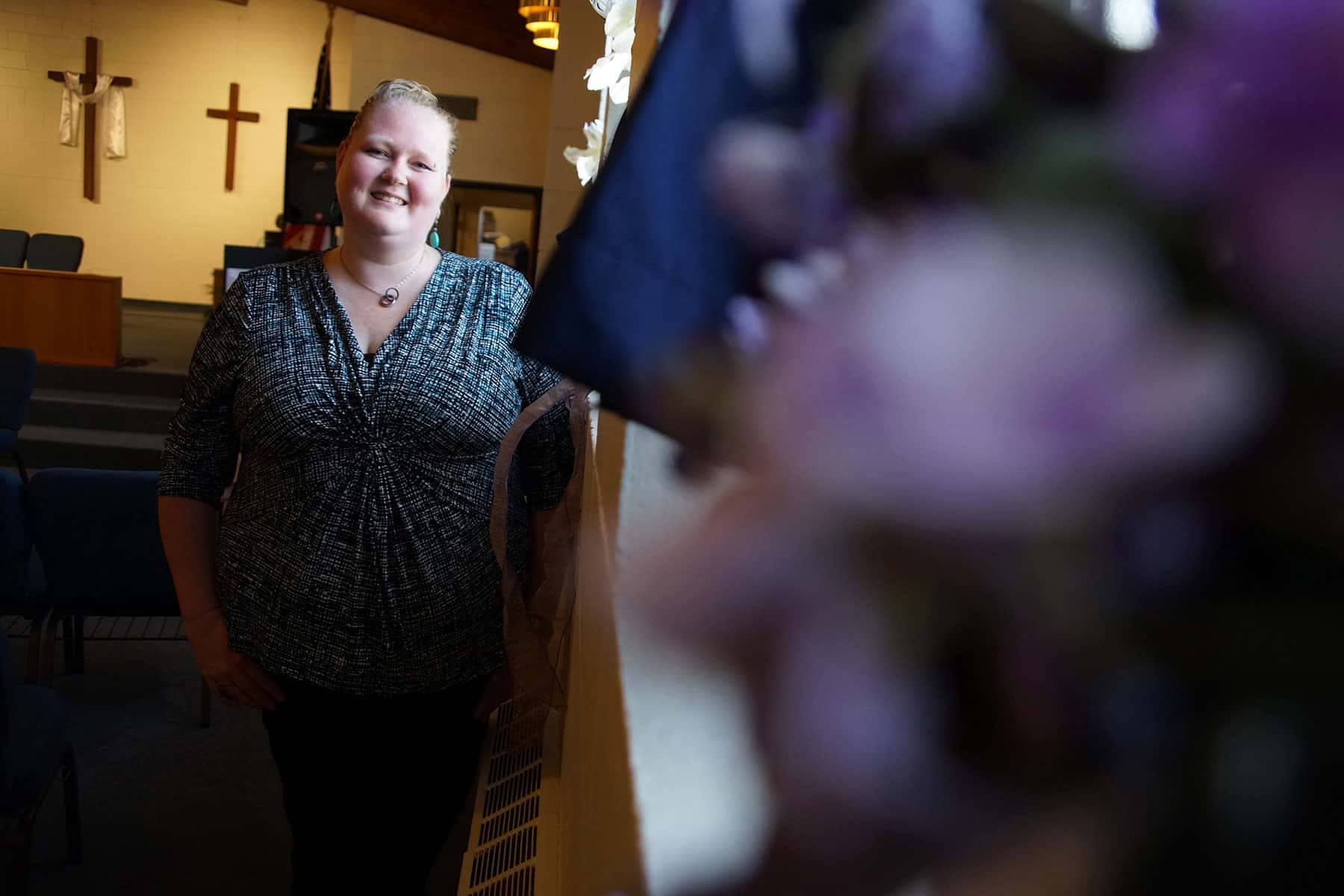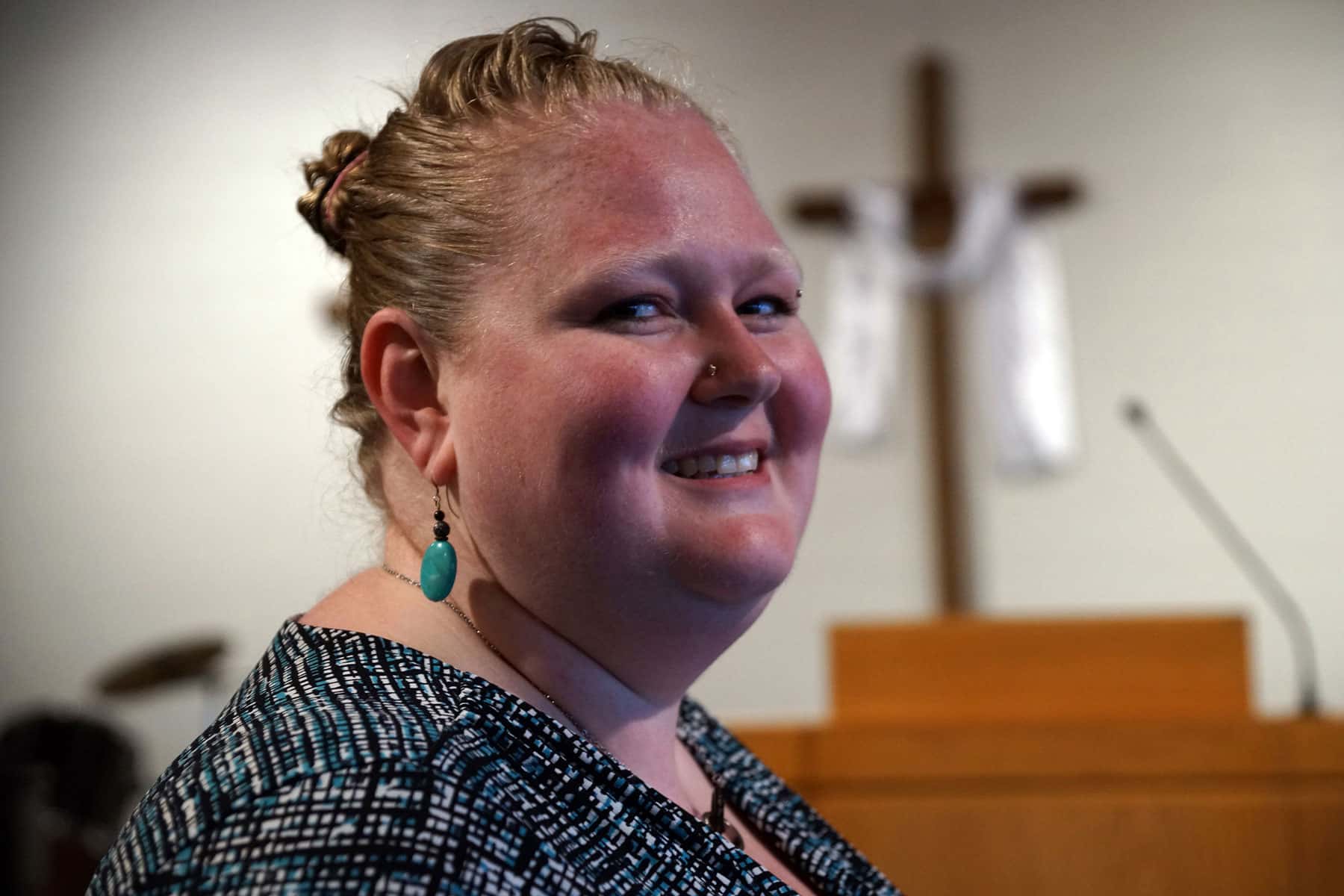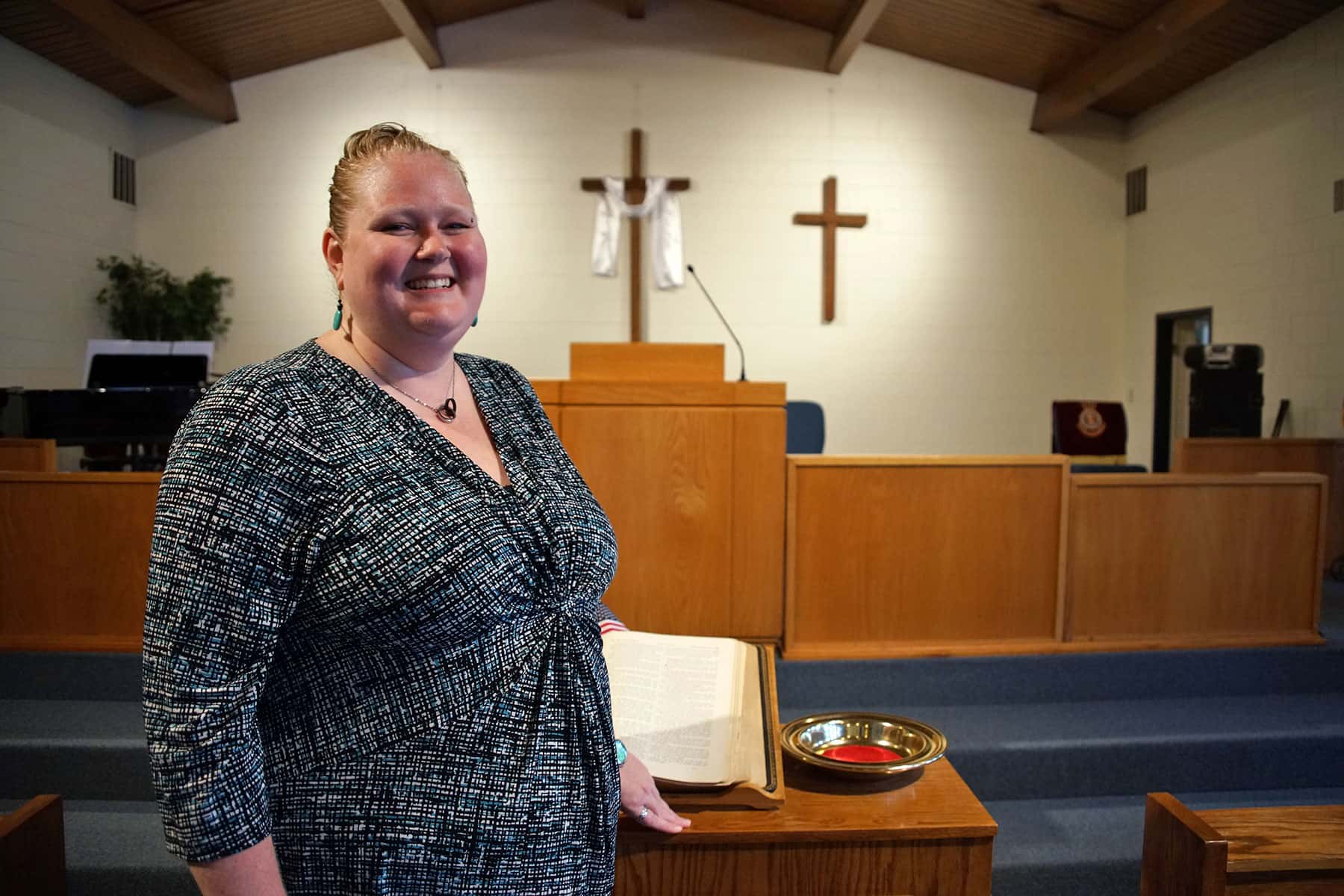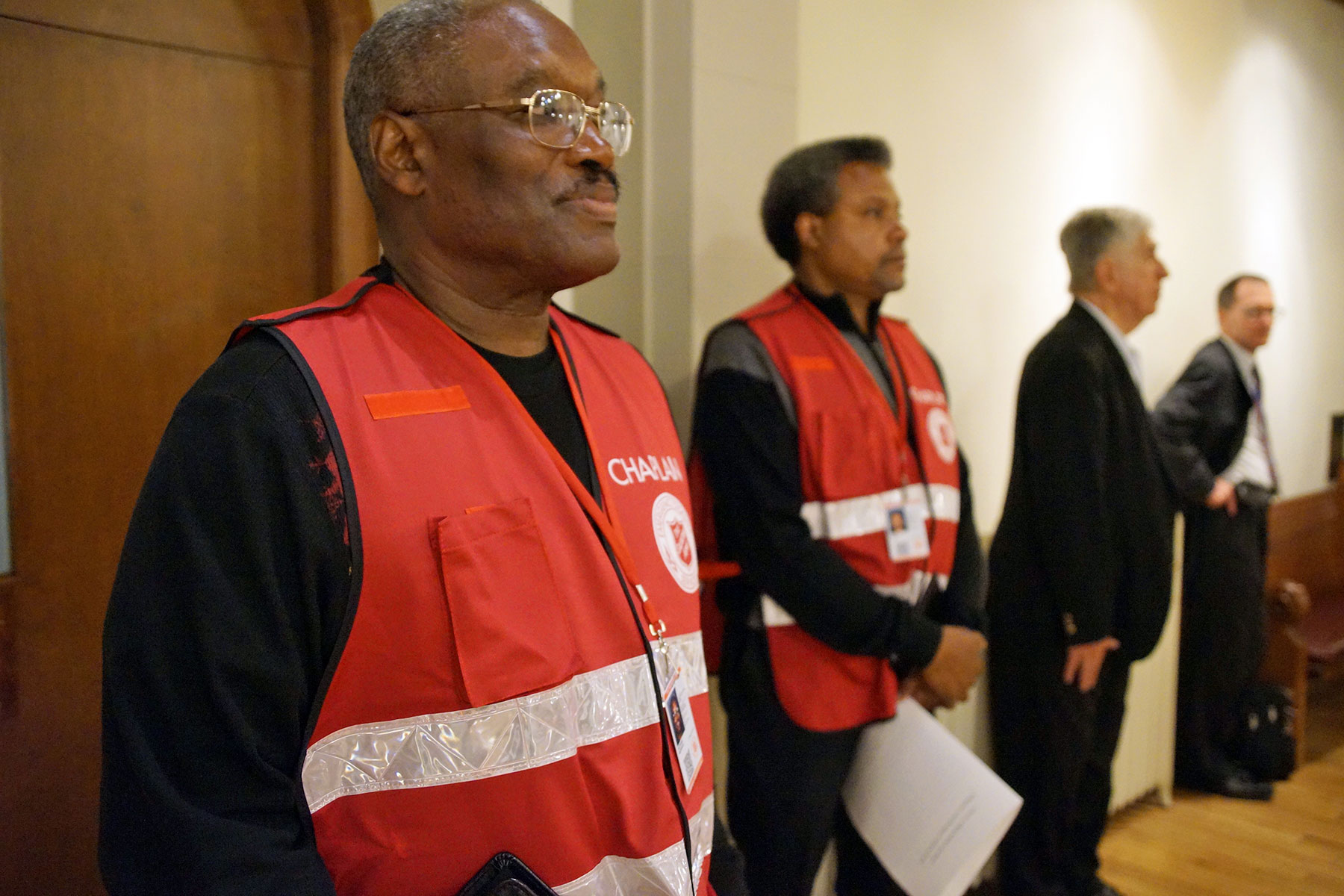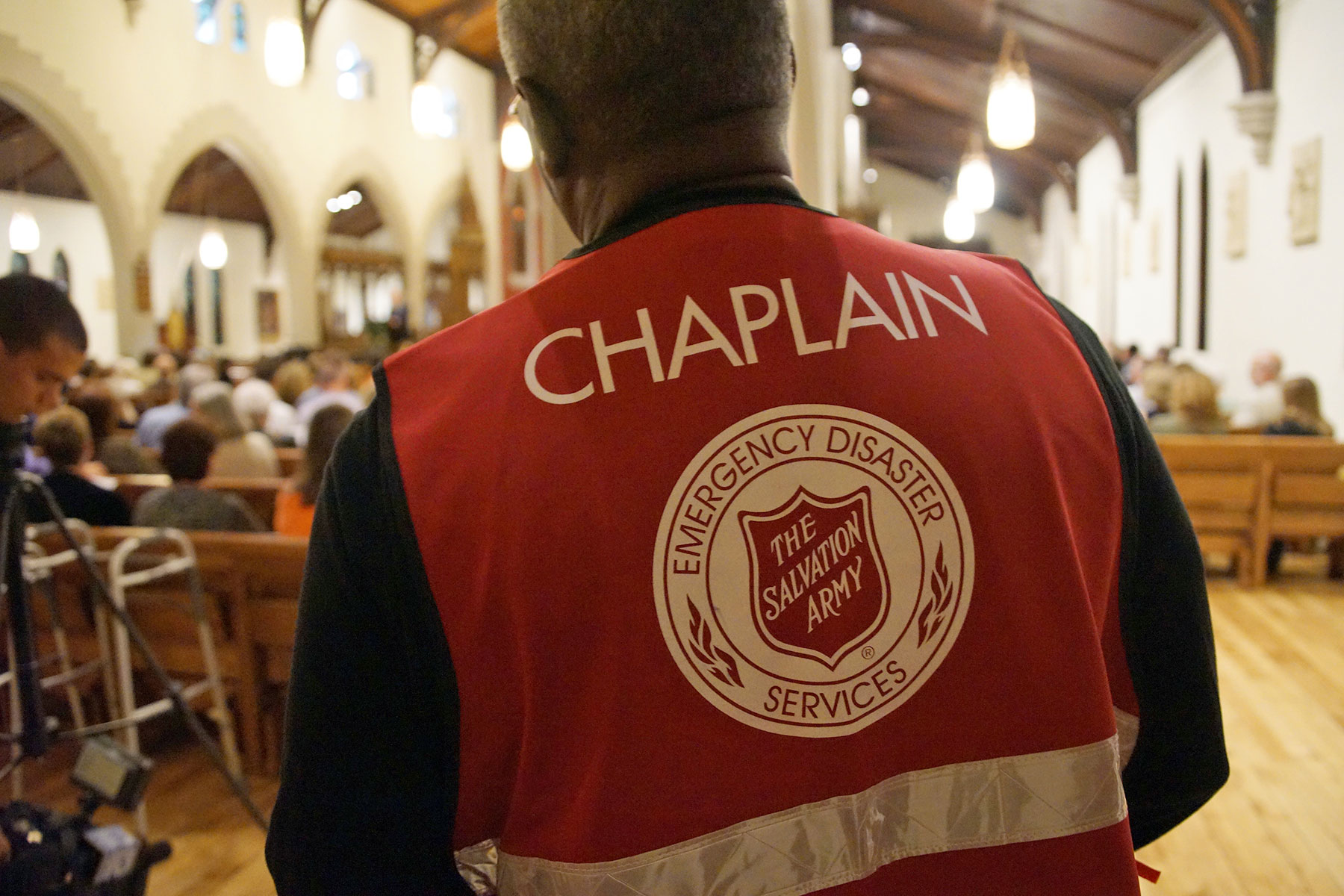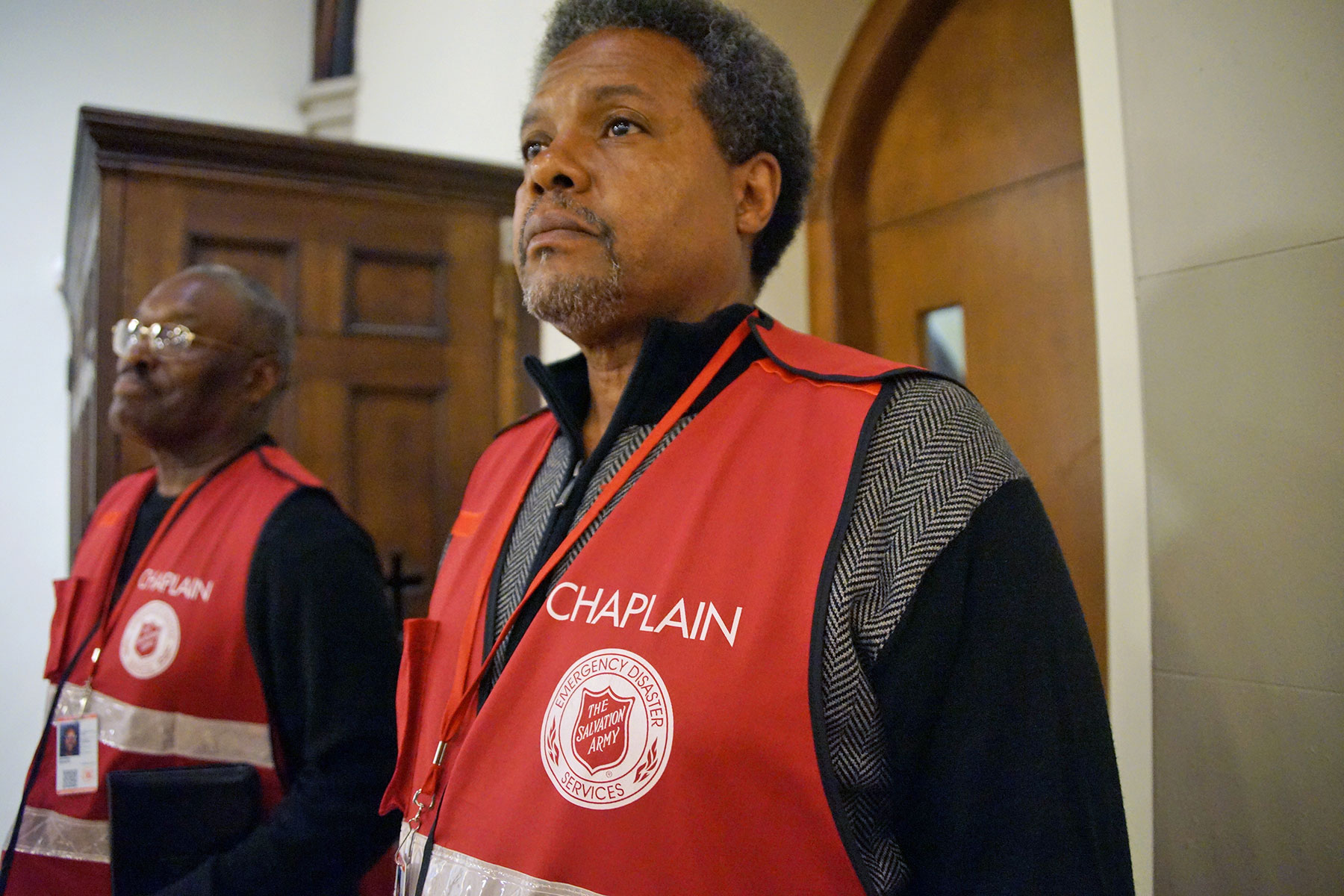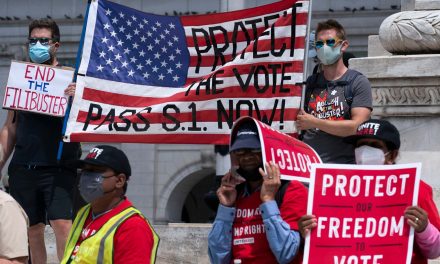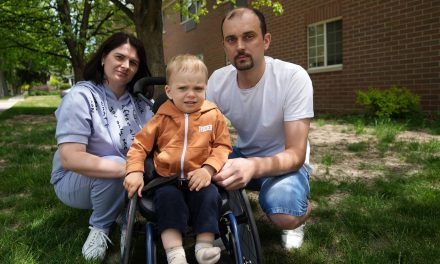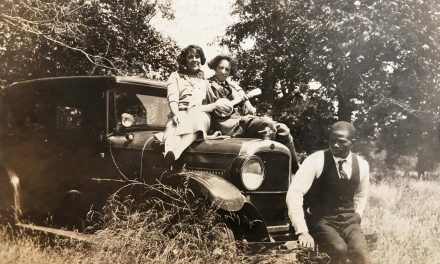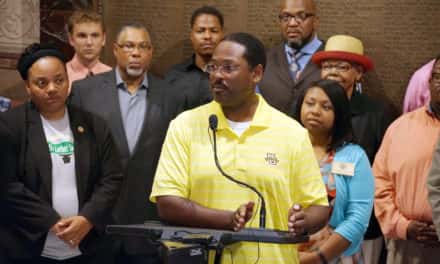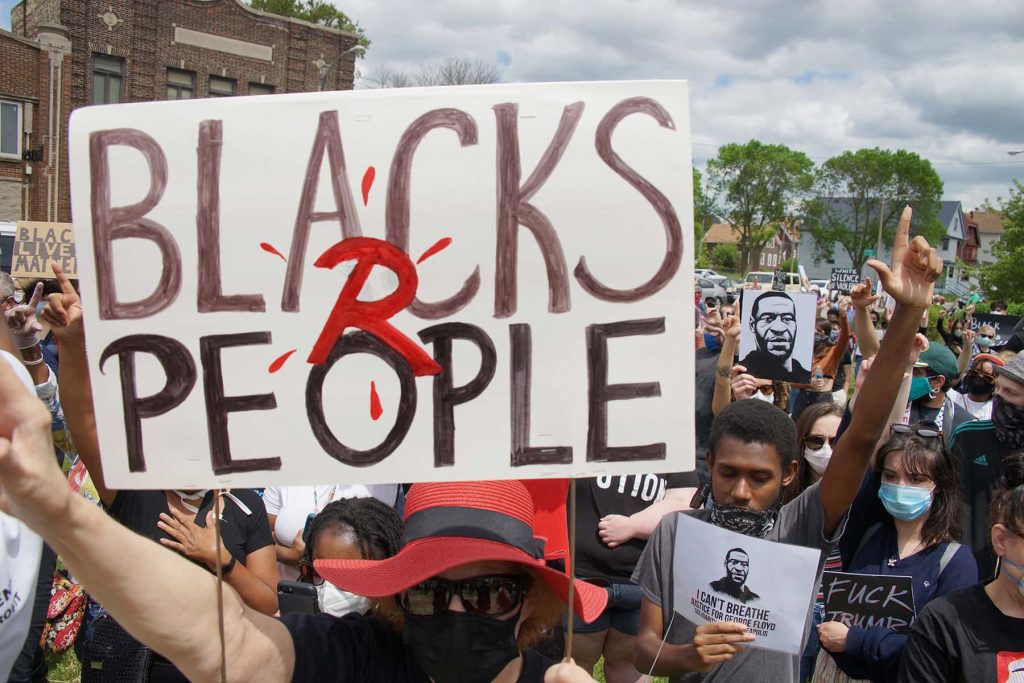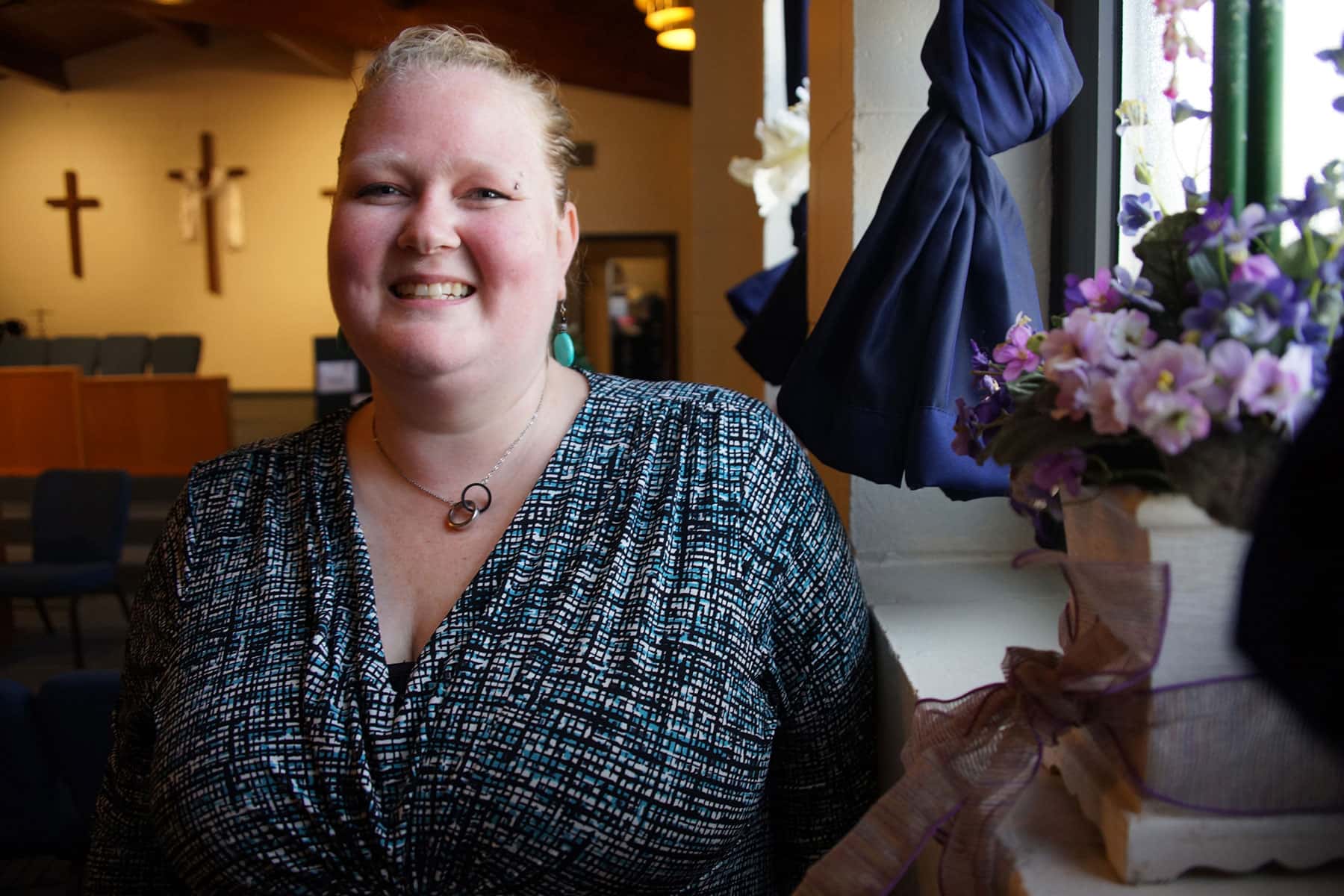
Standing as a bridge between police who struggle to express compassion while applying enforcement of the law and a grieving community raw with pain and limited resources to cope are the 51 Chaplains of The Salvation Army.
The unique and first of its kind program in the nation is coordinated by Pastor Alexis Twito, who has seen the powerful and healing impact of creating trust between the diverse faith community, police, and marginalized Milwaukee residents by building relationships with trust and striving to do the most good.
Q&A with Alexis Twito
Milwaukee Independent: What is the fondest memory of your youth, and who was the most influential person in your life?
Alexis Twito: The most influential person in my life growing up was my Grandma Ruth. She was, she is, the epitome of kindness, generosity, and faithfulness. Ever since I can remember, she was active at her church, with an especially deep passion for children’s ministry. I watched as she gave and gave of her time. Grandma Ruth also had the spirit of hospitality, always making sure people felt welcome, filling their bellies with good food, and their hearts with warmth and love. She taught me how to live my faith publicly, how to serve and love others. I continue to learn from her and am constantly blessed by her witness. And at 80 years old, she is still active in church, serving others, giving generously of her time to the community and her family, and living with love in her heart. She inspires me to be a better me.
Milwaukee Independent: As a Milwaukee native, how have you seen the city change over the years at a community level?
Alexis Twito: I have watched the city decline over the last 25 years. I have seen the population dwindle, jobs leave, major stores and factories close, and crime increase. I have watched as many of our stabilizing institutions in the community have suffered, churches throughout the city closing and schools falling into disrepair. I see people hurting from generational poverty and violence. But, I have also seen the resiliency of the people of Milwaukee. I have watched as the young people I grew up with have become influential leaders in this city. So many incredible organizations working to impact change in this city, and I believe they will do just that.
Milwaukee Independent: How is faith a part of your life and the work you do?
Alexis Twito: Everything I do comes out of my faith. I believe in a God that created the whole world and who loves everyone and everything in it. I believe that because God loved the world so much, God decided to became a part of the world, chose to live in the world. That belief urges me to see the beauty everywhere, and to become active and involved in the world around me. Because if God loves the world, it then becomes my duty to do what I can to create a world worthy of God. To work for justice and peace. To seek a world filled with forgiveness and mercy, a world where there is love. And there does not seem to be a better way for me to do that here in Milwaukee, at this moment in time, than to serve families in crisis through The Salvation Army Chaplaincy Program.
Milwaukee Independent: When did the chaplaincy program begin and how did The Salvation Army become involved?
Alexis Twito: The Salvation Army Chaplaincy Program officially began in May 2015. For years beforehand, throughout the Milwaukee Pоlіcе Department (MPD) and faith-community, there had been a desire to have some type of program where faith leaders would respond to the increasing number of hоmіcіdеs in Milwaukee. But in November 2014, when Laylah Peterson was kіIIed, a number of people became convinced that the time had come to finally get something official in place. And so, various people from MPD and the community began dreaming and strategizing about what such a program could look like. Among those individuals were then-Captain (now Inspector) Jutiki Jackson, Pоlіcе Officer Greg Hunter, and community leader Richard Schwoegler. As these leaders began to dream about what a partnership between faith leaders and the pоlіcе might look like, especially as it involved support at a crіmе scene, The Salvation Army was brought in to the conversation and asked to be a partner. The Salvation Army has long been known for their commitment to serving those in need, and it was thought that their Emergency Disaster Services program would provide a good foundation for the kind of training the chaplains would need to work with those in crisis. In the spring of 2015, The Milwaukee Pоlіcе Department and The Salvation Army created a memorandum of understanding for the program, and it was officially launched at the Mayor’s 2015 Cеаsеfirе Sabbath breakfast. Two weeks later, the first training was held and we welcomed approximately 50 chaplains to the program.
Milwaukee Independent: What is the focus of a chaplain’s duties, and what support do they have for being involved in such emotional and psychologically demanding work?
Alexis Twito: Our chaplains primary duty is to provide emotional and spiritual care to those experiencing trauma. We provide a calming ministry of presence. We pray for and with family members when it is asked for. We serve as a liaison between family and friends at a scene and the pоlіcе оffіcеrs, helping them to understand pоlіcе protocol and why they do what they do. We try to connect people to the kinds of resources they might need in the days and weeks to follow, such as counseling, financial services, dеаth and burial services, and bio-cleaning for the home.
All of our chaplains have completed the required training for the program, including a course called Spiritual and Psychological First Aid, offered through The Salvation Army, and Citizen Academy training, through the Milwaukee Pоlіcе Department. In addition to our training, many of our chaplains come into the program with various skills that allow them to thrive at these scenes. As pastors, social workers, counselors, nurses, and teachers, as leaders and ministers in their churches, they bring gifts that serve them as they minister to people in crisis. But, because this work is difficult, and emotionally demanding, we make sure to send our chaplains out in teams. Working in tandem allows them to have needed support on the ground. And following the incidents, as Coordinator, I often check in on the chaplains to see how they are doing. Some choose to debrief with each other, some with me, some with their home pastors. However, it is very important to us that our chaplains take care of themselves, so that they can best serve and care for others.
Milwaukee Independent: What are the ethnic and faith backgrounds of chaplains, and for what kind of incidents are they deployed in Milwaukee?
Alexis Twito: One of the things that makes me most proud of our program is our diversity. We are a beautiful and diverse reflection of Milwaukee. We are men and women, young and old. We are black, white, Hispanic, and Hmong. We are pastors and non-pastors who represent 13 different denominations from 39 different churches. In a city known for being the most segregated city in the country, our program brings people together across racial, ethnic, and faith backgrounds to serve those in crisis.
In 2016 we responded to 69 calls for service. One third of those calls were to hоmіcіdе scenes. We were also called to sites of suіcіdеs, fаtаl accidents, fires with fаtаlities, infаnt dеаths, persons in distress, and welfare checks. In August 2016, our chaplains responded to the scene of the оfficer-involved shооting which sparked the unrest in the Sherman Park neighborhood. And following the unrest, we were asked by the Pоlice Chief Ed Flynn and Mayor Tom Barrett to be present in the weeks that followed as crowds gathered near the site of the shооting and in the park. Our chaplains served as a calming, prayerful, peaceful presence in the midst of community turmoil.
Milwaukee Independent: Is there data to show how beneficial the chaplain program has been in Milwaukee, and if so how does the progress compare to other similar cities?
Alexis Twito: It is difficult to quantify the impact our chaplains are having on the community. Working in these traumatic situations, it might be days, weeks, even years before family members are able to understand the impact a chaplain had in helping them get through a crisis. We certainly hear positive feedback from families, and оfficers alike, who have thanked us for our presence. In fact, we recently got a letter from a family who received care from a team of chaplains after a particularly difficult and trаumаtic incident. In the letter, this parent thanked us for the ministry of the chaplains and said that they helped the family get through one of the worst days of their lives. We know that we are touching lives.
I only wish more cities had programs like ours that partner faith-leaders in the community with police departments to serve families in need. While many police departments around the country have police chaplains, there is no other Salvation Army Chaplaincy Program like this anywhere in the country. Our program, which emphasizes serving community members who have experienced trauma and connecting them to the resources and support that they need to heal in the long-run, is unique. And that we pull together so many people of multiple faith backgrounds from all over the city– well, that makes our program and partnership even more special.
Milwaukee Independent: What has being a chaplain taught you about yourself?
Alexis Twito: I learned that people you have never met can impact your life in ways you never thought or imagined. When I am at the scene with these families, a bit of their story stays with me and becomes a part of my story. I have learned that I am deeply humbled to be able to share these intimate, tragic, moments with, oftentimes, complete strangers. And while I never want to hear the emergency phone ring, I am so glad that we are there when it does, ready to respond to help those in need.
Milwaukee Independent: Was there a life experience that prepared you for the role of Chaplain Coordinator, or is this where your life journey has brought you?
Alexis Twito: It’s funny, a couple of years ago I could have never imagined being in this role as Chaplaincy Program Coordinator. I had known little about The Salvation Army before this program, and had little contact with vіctіms of crіmе before this. But, life has a funny way of unfolding and I truly believe that God had been preparing me for this all along. My whole faith and ministry journey has centered around serving those who are most in need. As an urban pastor, I began to not just extend that care to those in need due to poverty, but to those in need as a result of viоIеncе. In about 2013 I began volunteering with the District 7 Faith-based Initiative, because the church I was serving at the time, Capitol Drive Lutheran, was located within Pоlіcе District 7. That work led me to seeing the effects of viоIеncе and trаumа on families as we created a Community Action Team to do prayer walks after hоmіcіdеs in the district. And that work led me being called to support the family of Laylah Peterson after she was tragically shоt and kіIIed in her home in November of 2014. I did not have any specific experience with that before, other than the normal pastoral care duties over the years serving the church. But later as the chaplaincy program developed, I knew that it was something I wanted, and needed, to be a part of.
I think I came and brought the right gifts of leadership to the program at the right time. As a totally new program, it needed lots of organization and administration, and those were gifts I was able to bring to my role as Coordinator. In addition, I was able to use my passion for serving those affected by trаumа. I also have a passion for connecting people and helping them find ways to use their gifts, so it has been a blessing to coordinate our chaplains over the last 18 months. Watching them grow and develop, and engage in a meaningful and important ministry in the city to hurting people, is a joy.
Milwaukee Independent: The Salvation Army has come under criticism for various policies, particularly LGBT issues, so how do you explain this and also encourage discussions for policy change?
Alexis Twito: The Salvation Army’s mission is to preach the gospel of Jesus Christ, to meet human need, and to serve without discrimination. And that is what I have seen in everything I personally have experienced in the short time I have worked for them.
Milwaukee Independent: In your opinion, why do both people and organizations look for simple solutions to solve Milwaukee’s complex problems, instead of working to develop complex solutions? And is the chaplain program designed to solve a community problem or treat a never ending condition?
Alexis Twito: We like to think of the work we do as chaplains as two-fold. When we respond to emergency scenes, we are reacting to the effects of trauma and violence in the community. And that work, while necessary, might not stem the tide of viоIеncе or trаumа in the city. But, our chaplains do more than just respond to crіmе scenes. We also engage in community outreach, and in that capacity, we like to think we are being pro-active in helping build resiliency and healthier communities. We work alongside other faith communities, pоlіcе district faith-based initiatives, and pоlіcе оffіcеrs to find ways to support communities. By being present before crіmе strikes, by working together to bring needed resources like jobs, food, or other social services, in addition to prayer, we can help make a difference in neighborhoods and make Milwaukee a better and safer place to live.
Milwaukee Independent: The police are often blamed for failing the community, but where do churches fail the people they serve? And if a church is a reflection of its community, what does that say about Milwaukee residents?
Alexis Twito: It takes all of us working together, police, churches, neighborhood residents, even the media, to build healthy and safe neighborhoods for families to live in.
Milwaukee Independent: What is your hope for the future of Milwaukee, and the conditions for those living in the most disadvantaged communities?
Alexis Twito: I have hope that Milwaukee can again become a city that we are all proud to live in. A city of hope, a city where we take care of each other. It will not be easy and we have a lot of work to do. But I truly believe that if we work together and share resources, we can create a community that we will be proud to call home. I also believe, though, that we need to ask difficult questions of ourselves and our leaders. We need to address the racism that has divided our city, the economics that have devastated families, and the lack of resources and opportunities that have created a hopelessness that has led to a disengagement from one another.
Our chaplaincy program plays a role in the healing of Milwaukee by helping those in the worst grip of trauma know that they are not alone. We assist people to find the resources and help they need to become resilient, and we also serve as a model of what can be accomplished when we set aside our differences to work together to accomplish shared goals.

